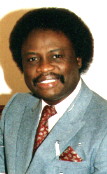RACISM: A
Question of Human Conscience --- OUTCRY Magazine, June/July,
1998 |
|
American
RACISM
A Look Inside the Window of Human Conscience |
|
Looking
at American Racism From the Eyes of an Outsider by 'Yinka Vidal |
 'Yinka Vidal |
|
| An Issue of Human Conscience: The
Issue of Racism in America |
| President Clinton has motivated a
national dialogue to end racism in America prior to his journey to Africa and even more
after he returned. His achievements regarding this issue deserve a medal. The issue of
racism, prejudice and discrimination is a matter of human conscience no matter who is
affected. After all the civil right struggles in the 1960s and 1970s,
many things have changed, and serious problems of racism still exist in the United States.
Whites make their accusations, Blacks make their allegations, and there are people on both
sides working hard to bridge the gaps between the races. |
|
Some people believe in building bridges through busing
Black children to White schools. Others advocate for racial integration through housing.
Some politicians support affirmative programs to bridge economic gaps by giving Blacks
better education and job opportunities. And a smaller group of people believe in
inter-racial marriage as one of the primary solutions to bridge racial gaps in this
country.
Whether any of these solutions will work depend on taking a look
at the dynamism of human behavior and relationship of the job. Overcoming
the Invisible Crime written by 'Yinka Vidal (published by Lara
Publications, Florissant, MO, 352 pages, $19.99) is the memoir of an outsider (an African)
based on his experience in working as a professional in the health care industry. It is a
shocking and provocative look at prejudice, racism, selfishness, victimization, and
intolerance in corporate America against people different from us. When you read this
book, you will ask yourself time and time again, what happened to the human conscience?
The book is not designed to cast blames as much as it is designed to look at the dynamism
of human behavior, and how we sometimes feel comfortable hurting others outside of our own
group. Perhaps the issues raised in the book are the reasons why some Black have given up
seeing what is happening to educated Blacks in corporate America.
Overcoming the Invisible Crime also discusses solutions to the
problem of racism in America starting from the prologue of the book. People from both
races standing up against racism should be applauded, but many people need to look inside
their own consciences as they evaluate the ways they treat others different from them.
Although Whites have a lot of work to do in the process of
reducing the sufferings and tensions induced by racism, prejudice and bigotry
(particularly on the job against minorities) the heavier weight however, lies on the
shoulders of minorities. It is grossly unfair to blame Whites for all the problems created
by racism. Both Blacks and other minorities must design and implement effective strategies
to solve social problems within their communities, using their organizations -- and
consequently be empowered to take control of their lives and destiny.
"Always remember, life is a journey through a temporary
existence. One day, we have to be held accountable for what we have done to others.
Justice and fairness are in the eyes of the beholder because of our inner mind-set and
preconceived notions. Never be afraid to stand up for fairness and for the truth. Only the
truth can set people free. The essence of life is not what we derive at others' expense,
but for those hearts we are able to touch with our kindness, love and compassion." ---
author 'Yinka Vidal, December, 1993.
"A heartrending story" -- Diane Sawyer PrimeTime
Live ABC News.
"A Valuable and interesting piece of work, a convincing and
compelling piece on health care problems. A treasure store of information on African
culture, views on American racism, and a positive contribution to the politics of race in
recent years." -- Dr. 'Femi Ferreira, Professor of Political Science, Hutchinson
Community College, Hutchinson, Kansas.
Website: www.outcrybookreview.com/hospitals2.htm